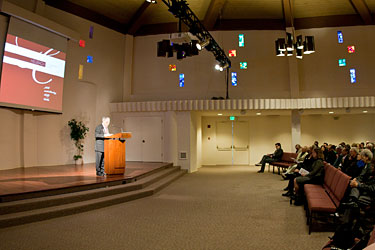Learn More About PUC
Doukhan Presents Heubach Lecture on Creation
By Larry Pena on February 23, 2011
Share this

Noted Biblical scholar Jaques Doukhan presented the semi-annual Heubach Lecture on Sabbath, February 19, to a packed audience in PUC’s Scales Chapel. The Heubach Lectureship is an informative series honoring former PUC religion professor Paul Heubach, and it is aimed at examining central truths of Christianity in easily understood terms.
Doukhan is a professor of Hebrew and Old Testament exegesis at the Seventh-day Adventist Theological Seminary and director of the Institute for Jewish-Christian Studies at Andrews University in Berrien Springs, Mich. His lecture, entitled “’Yes’ to Creations: More Than ‘No’ to Evolution,” approached the literary elements of the Genesis creation story, exploring both the structures of the account and the story’s centrality to authentic Christian faith.
After an introduction by former Andrews colleague and current PUC president Heather Knight, Doukhan introduced his topic with the assertion that creation and evolution are fundamentally exclusive explanations of origins. He warned that too often, discussions of creation focus on contradicting evolutionary theory, when the creation story is a rich and meaningful topic on its own.
He then discussed the Genesis account in its original Hebrew form, highlighting the beauty and poetry of the words and sounds. The structure, he says, serves several purposes: to make the story memorable and appealing; and, in the context of the culture in which it was written, to enhance the account’s credibility as a factual, historical document.
Doukhan went on to further explore the original context of the creation account. The modern tendency of many Christians to treat Biblical accounts as non-historical allegories that illustrate spiritual truths, he says, is an aberration. He explained that for the culture in which the creation story was written, the spiritual and philosophical value of a story could only be grounded in its historical truth.
He next discussed some of the deep layers of meaning within the text. The two perspectives on the creation account contained in Genesis 1 and 2, he says, illustrate two paradoxical elements of God’s divinity—His vast, unfathomable transcendence, and His intimate involvement in human lives.
Doukhan discussed the appropriate responses to the creation story. The duality of God, he says, suggest a hybrid form of worship—reverence for the cosmic Creator and joy that God is near. The “goodness” emphasized in the account, he explains, is a call to fully enjoy all the physical gifts God has given, but within His given parameters.
Finally, Doukhan illustrated how a response to the implications of the creation story forms the basis for the unique principles, and even the very name, of the Seventh-day Adventist faith. The “Seventh-day” is an affirmation of creation—that the Adventist emphases on Sabbath, health, rejection of an immortal soul, and concern for human suffering, all stem from gratitude for the physical world God has made. The “Adventist” is a focus on God’s transcendence, the heavenly creation, and the kingdom of God to come. Doukhan warned against separating those two elements of Seventh-day Adventism. The creation story, he said, illustrates that “we need to join both—to be both human and holy.”
Latest News
Nursing Students & Faculty Return to Fiji to Serve Their Mana Family
By Ally Romanes on April 16, 2025
PUC’s Department of Music Hosts Unforgettable Festival
By Ally Romanes on April 3, 2025
Rasmussen Art Gallery Hosts Annual Faculty Show
By Ally Romanes on March 24, 2025
Vox Pro Musica & Mosaic Strings Tour Phoenix
By Ally Romanes on March 13, 2025
